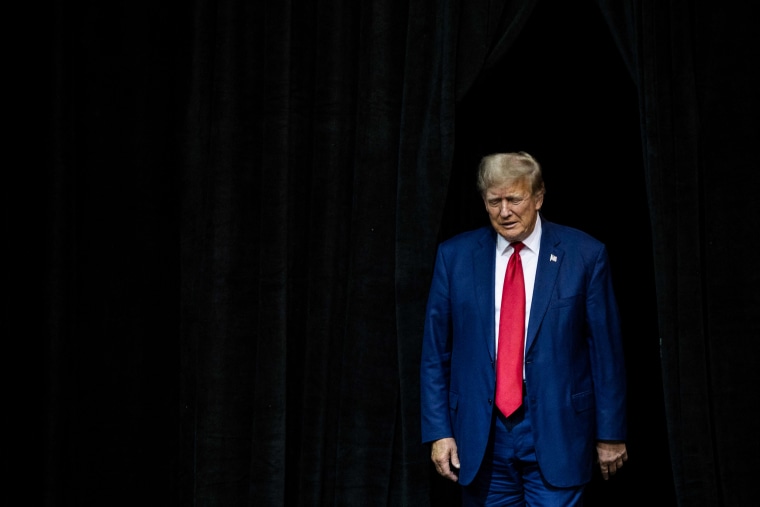The judge presiding over the federal criminal case alleging Donald Trump willfully mishandled national security secrets issued an order Wednesday limiting the former president's access to the evidence and barring him from publicly discussing sensitive material.
The 16-page order from U.S. District Judge Aileen Cannon is largely in line with a proposal special counsel Jack Smith's team submitted in July for how Trump and his attorneys should handle national security information at the center of the case.
"The limitations on disclosure of classified information set forth in this Order are binding on Defendant and his counsel and violations may result in criminal and/or civil penalties," Cannon wrote. The version prosecutors proposed called for the order to be "forever binding."
Despite Trump's public assertions that he had declassified all the documents FBI agents found when they searched his Florida resort with a warrant last year, the order refers to the materials in question as still being classified.
"The Court finds that this case will involve information that has been classified in the interest of national security," and the "storage, handling, and control of this information will require special security precautions," Cannon wrote.
"All classified documents or material and the information contained therein shall remain classified unless the documents or material bear a clear indication that they have been declassified by the agency or department that is the originating agency of the document, material, or information contained therein," she continued.
The ruling does not shut the door on Trump's declassification arguments. Cannon, whom Trump nominated to the bench, said in a footnote that her order is “entered without prejudice to any potential challenges” to the “purported classification status of certain documents at issue in this action” or "to arguments/defenses raised under the Presidential Records Act."
The order also prohibits Trump from publicly discussing any of the evidence marked classified. That also applies to information that enters the "public domain" without first having been explicitly declassified by the government.
Trump may, however, "disclose classified information to the defense as necessary for the preparation of his defense," Cannon wrote.
The order further says the "defense may disclose classified information to the Defendant unless the government informs the defense when providing the information that it will be moving the Court for an order to prohibit" its disclosure.
Trump and his defense team can discuss or review the classified information only inside a court-approved sensitive compartmented information facility, or SCIF, or another "authorized area," Cannon said.
While Trump's attorneys had asked Cannon to “re-establish” a SCIF that had been at place at Mar-a-Lago during his presidency, she did not mention the request in her order. She said a designated "Classified Information Security Officer" already involved in the case would establish "procedures to assure a SCIF is accessible during business hours to the defense, and at other times upon reasonable request as approved by the CISO in consultation with the Court and United States Marshals Service."
"No classified documents, material, recordings, or other information may be removed from the SCIF" without prior approval, the order says. "Any classified audio recordings that the government discloses to the defense shall be maintained by the CISO in the SCIF. Such recordings may only be reviewed on a stand-alone, nonnetworked computer or other device within the SCIF that does not have the capability to duplicate or transmit information. The defense must use headphones to review such recordings, and the headphones must be wired and not have any wireless capability," the order continues.
A spokesperson for Trump did not immediately respond to a request for comment on the order.
The court filing revealed that Trump's counsel of record in the case must "possess at least interim security clearances, permitting them to have access to classified information designated as 'CONFIDENTIAL,' 'SECRET,' or 'TOP SECRET.'"
The decision followed a sealed hearing on the matter Tuesday.
Trump was indicted in June and accused of lying and scheming to mislead federal investigators to hold on to sensitive government documents he'd taken from the White House and knew were still classified, despite his protestations to the contrary.
Trump has pleaded not guilty, as have his two co-defendants in the case, which is scheduled to go to trial in May.
The order is the third of its kind filed against Trump in the four criminal cases he faces.
In May, Judge Juan Merchan in New York issued an order restricting Trump from posting on social media about evidence being turned over to his lawyers in Manhattan District Attorney Alvin Bragg's case alleging he falsified business records tied to hush-money payments during his 2016 presidential campaign.
Last month, U.S. District Judge Tanya Chutkan, who's presiding over Smith's case in Washington, D.C., alleging Trump tried to subvert the results of the 2020 election, issued an order restricting how Trump’s team can handle hundreds of thousands of pages of discovery that will be turned over to it.
In the fourth criminal case, stemming from charges in Fulton County, Georgia, alleging that Trump and his allies tried to illegally overturn the election results in Georgia, Trump has not been the subject of an order similar to those in his other criminal cases, but his bond order said he “shall make no direct or indirect threat of any nature” against any co-defendant, witness or victim, the community or property in the community.
“The above shall include, but are not limited to, posts on social media or reposts of posts made by another individual on social media,” the order said.
Trump has pleaded not guilty in all four cases, claiming the charges are politically motivated.

